Analysis of Pre-licensure Nursing Programs: ABSN, ADN, BSN (Nursing)
VerifiedAdded on 2022/10/17
|12
|1043
|6
Presentation
AI Summary
This presentation provides a comprehensive comparison of three pre-licensure nursing programs: Accelerated Bachelor of Science in Nursing (ABSN), Associate Degree in Nursing (ADN), and Bachelor of Science in Nursing (BSN). The presentation details key aspects of each program, including common courses, clinical components, total credit hours, accreditation status, program length, classroom structure, completion and retention rates, NCLEX pass rates, admission requirements (GPA), faculty credentials, and expected salaries upon completion. It explores the advantages and disadvantages of each program, outlines various career prospects, and addresses adherence to nursing standards like AACN Essentials. Furthermore, the presentation evaluates each program's relevance to current trends in nursing education, incorporating multimedia graphics to support the content and provide a comprehensive analytic evaluation. The analysis includes program goals and mission statements, offering a detailed overview of the nursing education landscape for prospective students.
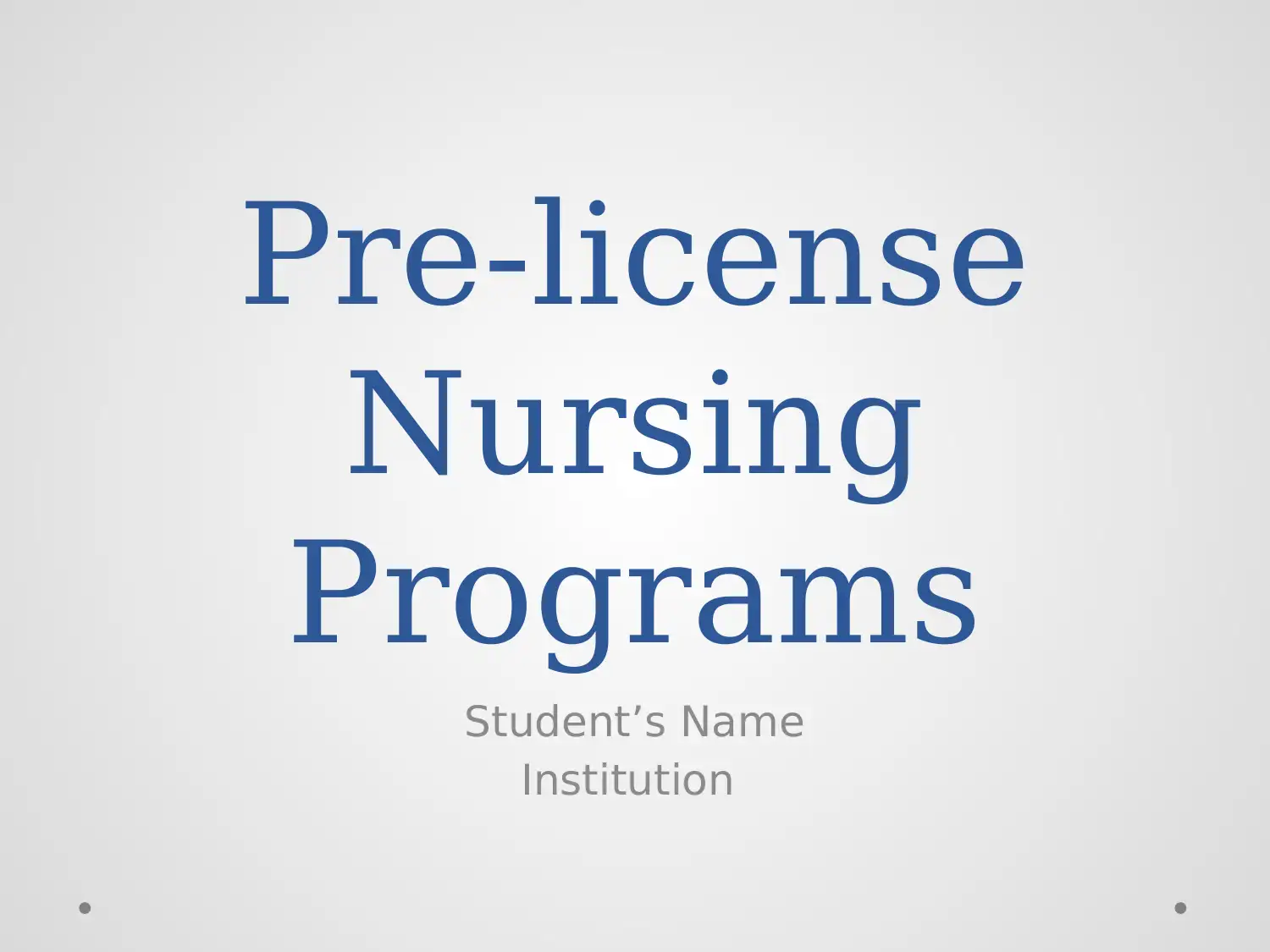
Pre-license
Nursing
Programs
Student’s Name
Institution
Nursing
Programs
Student’s Name
Institution
Paraphrase This Document
Need a fresh take? Get an instant paraphrase of this document with our AI Paraphraser
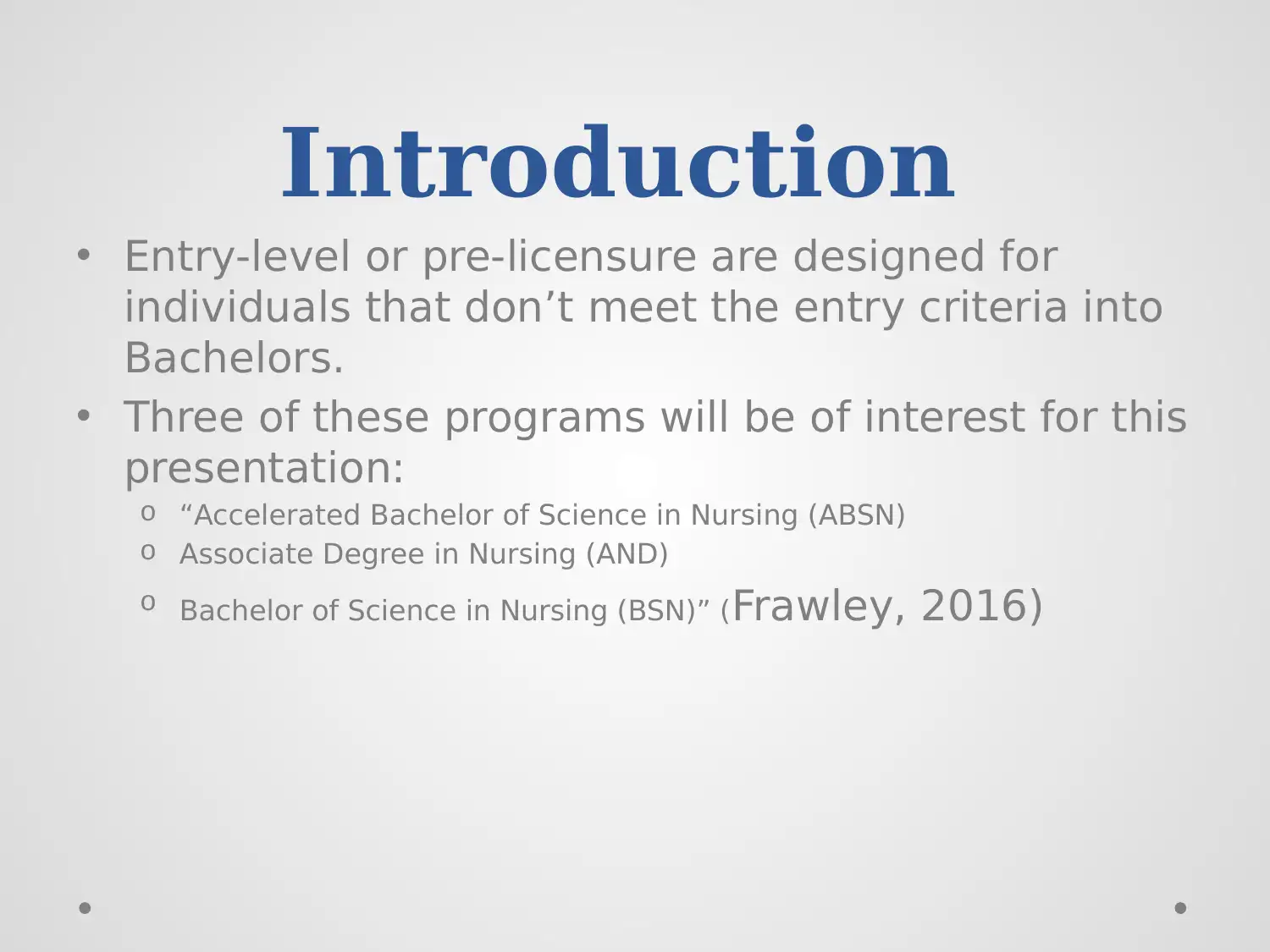
Introduction
• Entry-level or pre-licensure are designed for
individuals that don’t meet the entry criteria into
Bachelors.
• Three of these programs will be of interest for this
presentation:
o “Accelerated Bachelor of Science in Nursing (ABSN)
o Associate Degree in Nursing (AND)
o Bachelor of Science in Nursing (BSN)” (Frawley, 2016)
• Entry-level or pre-licensure are designed for
individuals that don’t meet the entry criteria into
Bachelors.
• Three of these programs will be of interest for this
presentation:
o “Accelerated Bachelor of Science in Nursing (ABSN)
o Associate Degree in Nursing (AND)
o Bachelor of Science in Nursing (BSN)” (Frawley, 2016)
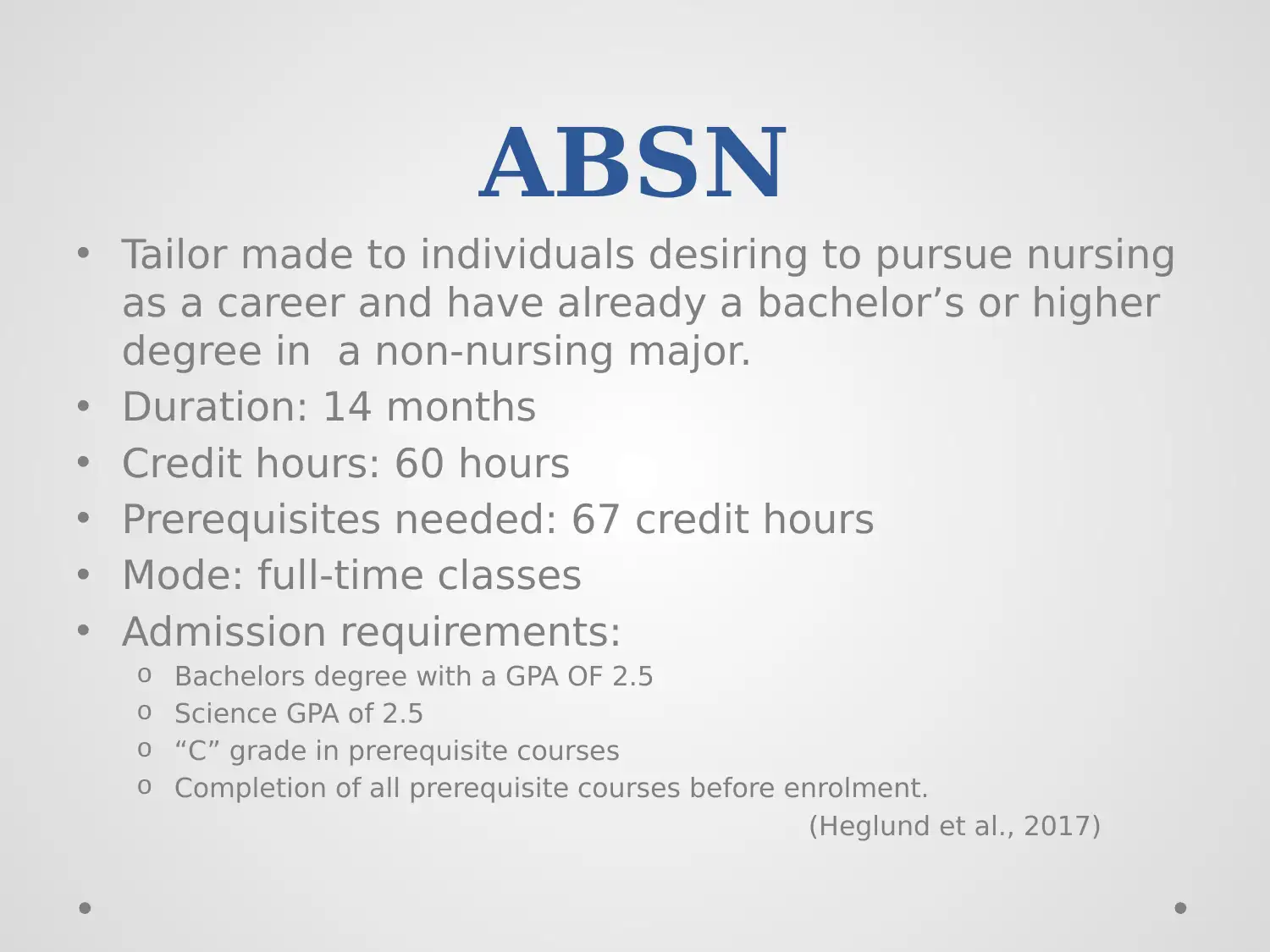
ABSN
• Tailor made to individuals desiring to pursue nursing
as a career and have already a bachelor’s or higher
degree in a non-nursing major.
• Duration: 14 months
• Credit hours: 60 hours
• Prerequisites needed: 67 credit hours
• Mode: full-time classes
• Admission requirements:
o Bachelors degree with a GPA OF 2.5
o Science GPA of 2.5
o “C” grade in prerequisite courses
o Completion of all prerequisite courses before enrolment.
(Heglund et al., 2017)
• Tailor made to individuals desiring to pursue nursing
as a career and have already a bachelor’s or higher
degree in a non-nursing major.
• Duration: 14 months
• Credit hours: 60 hours
• Prerequisites needed: 67 credit hours
• Mode: full-time classes
• Admission requirements:
o Bachelors degree with a GPA OF 2.5
o Science GPA of 2.5
o “C” grade in prerequisite courses
o Completion of all prerequisite courses before enrolment.
(Heglund et al., 2017)
⊘ This is a preview!⊘
Do you want full access?
Subscribe today to unlock all pages.

Trusted by 1+ million students worldwide
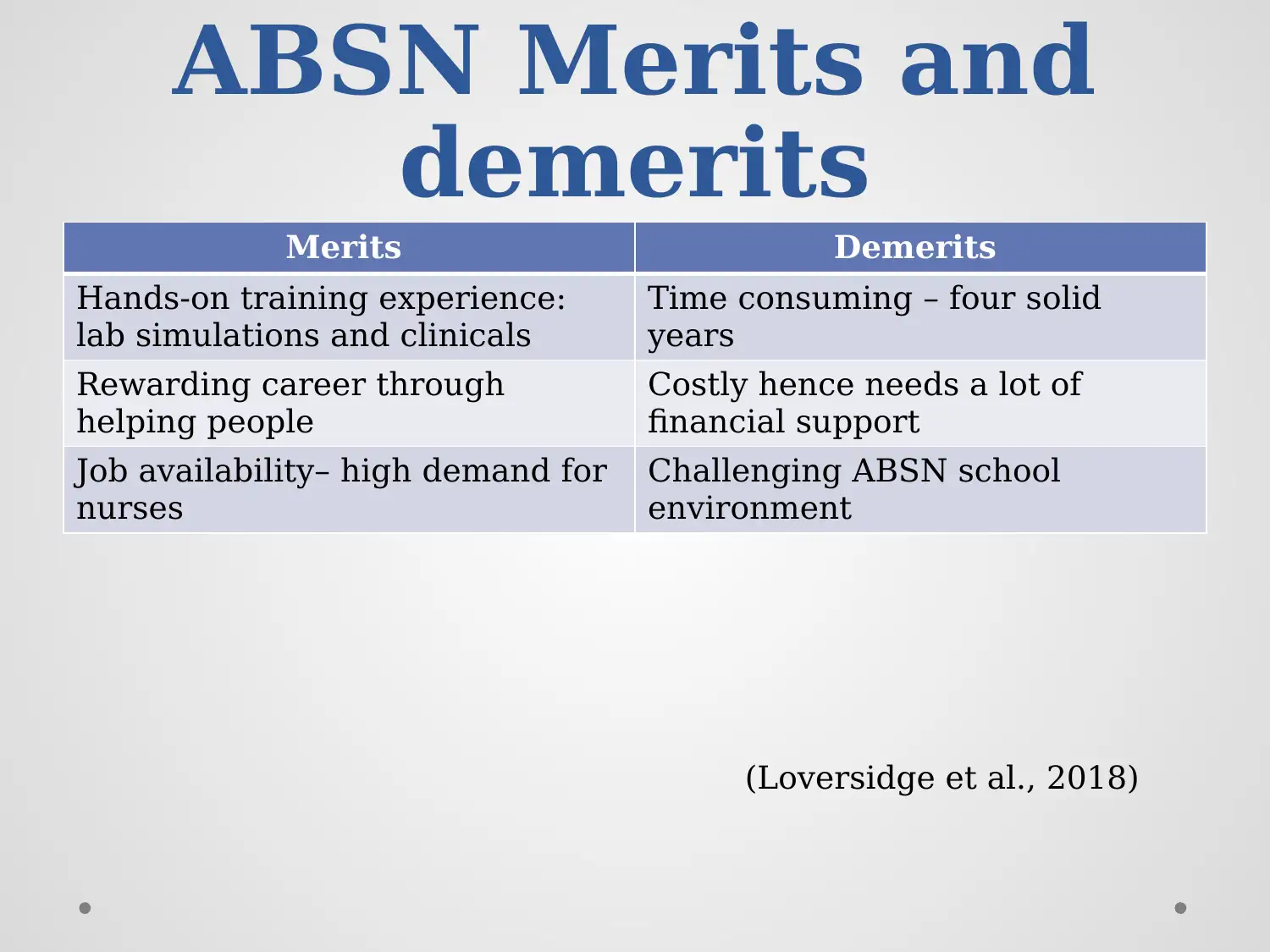
ABSN Merits and
demerits
Merits Demerits
Hands-on training experience:
lab simulations and clinicals
Time consuming – four solid
years
Rewarding career through
helping people
Costly hence needs a lot of
financial support
Job availability– high demand for
nurses
Challenging ABSN school
environment
(Loversidge et al., 2018)
demerits
Merits Demerits
Hands-on training experience:
lab simulations and clinicals
Time consuming – four solid
years
Rewarding career through
helping people
Costly hence needs a lot of
financial support
Job availability– high demand for
nurses
Challenging ABSN school
environment
(Loversidge et al., 2018)
Paraphrase This Document
Need a fresh take? Get an instant paraphrase of this document with our AI Paraphraser
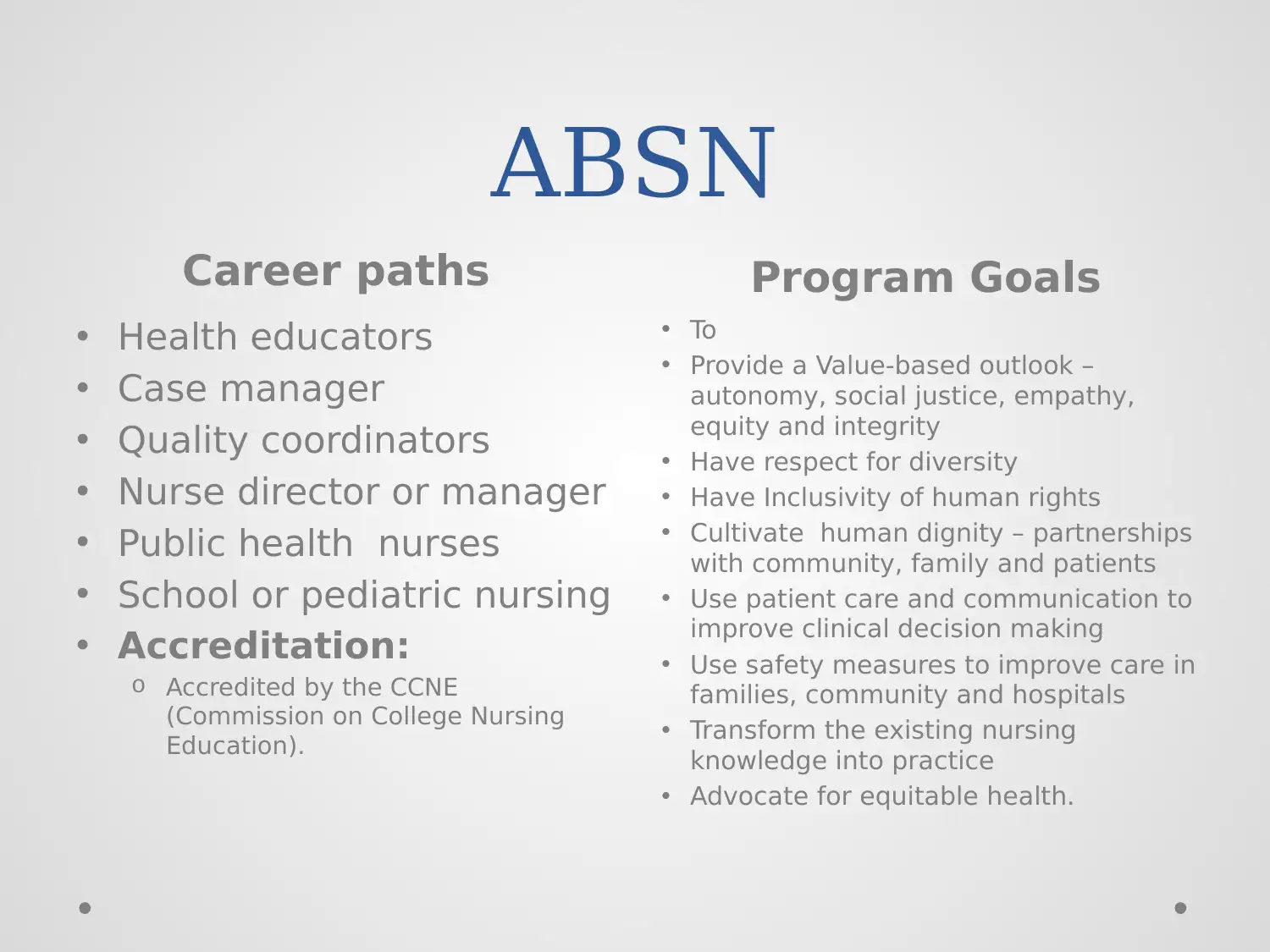
ABSN
Career paths Program Goals
• Health educators
• Case manager
• Quality coordinators
• Nurse director or manager
• Public health nurses
• School or pediatric nursing
• Accreditation:
o Accredited by the CCNE
(Commission on College Nursing
Education).
• To
• Provide a Value-based outlook –
autonomy, social justice, empathy,
equity and integrity
• Have respect for diversity
• Have Inclusivity of human rights
• Cultivate human dignity – partnerships
with community, family and patients
• Use patient care and communication to
improve clinical decision making
• Use safety measures to improve care in
families, community and hospitals
• Transform the existing nursing
knowledge into practice
• Advocate for equitable health.
Career paths Program Goals
• Health educators
• Case manager
• Quality coordinators
• Nurse director or manager
• Public health nurses
• School or pediatric nursing
• Accreditation:
o Accredited by the CCNE
(Commission on College Nursing
Education).
• To
• Provide a Value-based outlook –
autonomy, social justice, empathy,
equity and integrity
• Have respect for diversity
• Have Inclusivity of human rights
• Cultivate human dignity – partnerships
with community, family and patients
• Use patient care and communication to
improve clinical decision making
• Use safety measures to improve care in
families, community and hospitals
• Transform the existing nursing
knowledge into practice
• Advocate for equitable health.
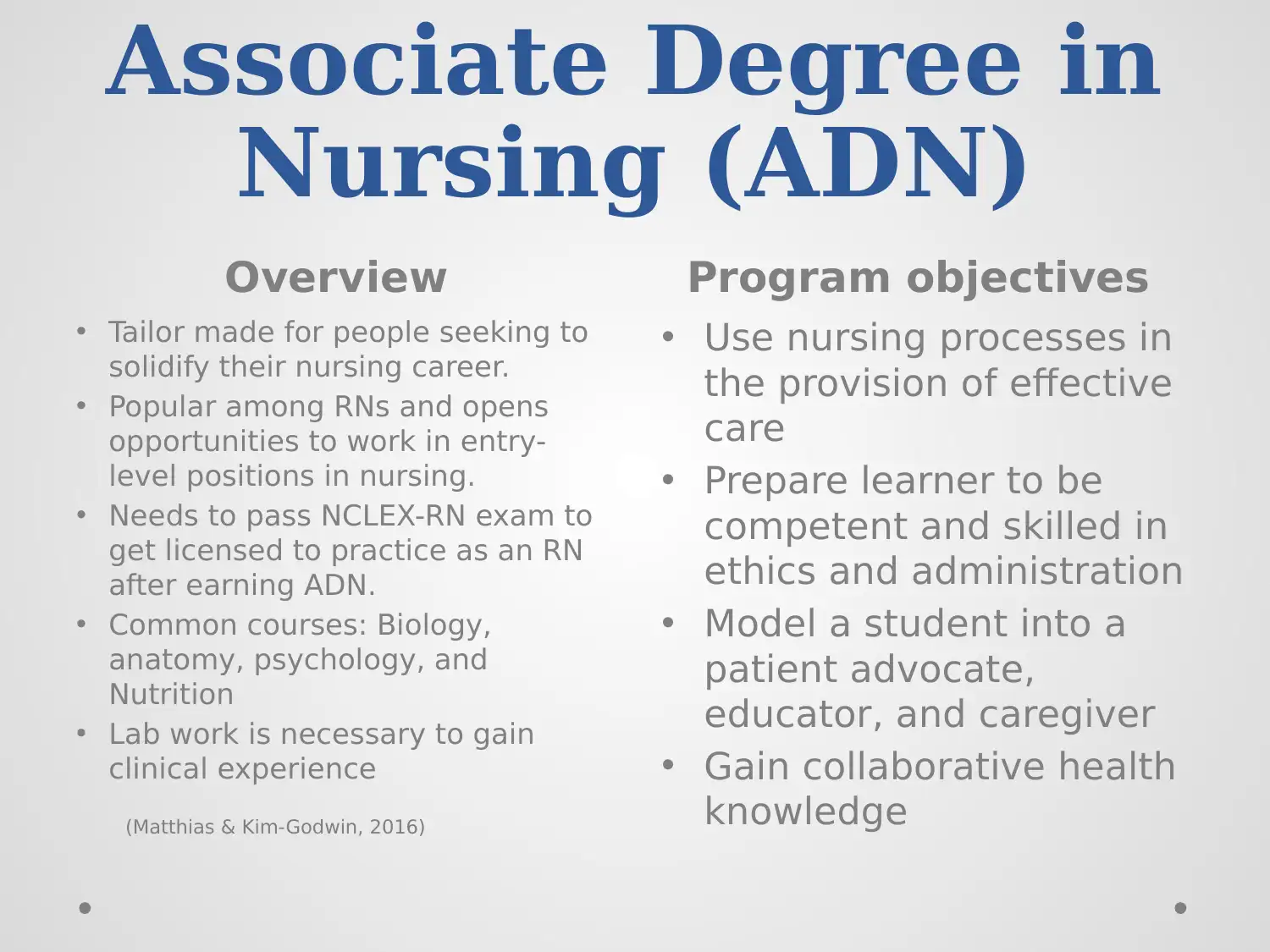
Associate Degree in
Nursing (ADN)
Overview Program objectives
• Tailor made for people seeking to
solidify their nursing career.
• Popular among RNs and opens
opportunities to work in entry-
level positions in nursing.
• Needs to pass NCLEX-RN exam to
get licensed to practice as an RN
after earning ADN.
• Common courses: Biology,
anatomy, psychology, and
Nutrition
• Lab work is necessary to gain
clinical experience
(Matthias & Kim-Godwin, 2016)
• Use nursing processes in
the provision of effective
care
• Prepare learner to be
competent and skilled in
ethics and administration
• Model a student into a
patient advocate,
educator, and caregiver
• Gain collaborative health
knowledge
Nursing (ADN)
Overview Program objectives
• Tailor made for people seeking to
solidify their nursing career.
• Popular among RNs and opens
opportunities to work in entry-
level positions in nursing.
• Needs to pass NCLEX-RN exam to
get licensed to practice as an RN
after earning ADN.
• Common courses: Biology,
anatomy, psychology, and
Nutrition
• Lab work is necessary to gain
clinical experience
(Matthias & Kim-Godwin, 2016)
• Use nursing processes in
the provision of effective
care
• Prepare learner to be
competent and skilled in
ethics and administration
• Model a student into a
patient advocate,
educator, and caregiver
• Gain collaborative health
knowledge
⊘ This is a preview!⊘
Do you want full access?
Subscribe today to unlock all pages.

Trusted by 1+ million students worldwide
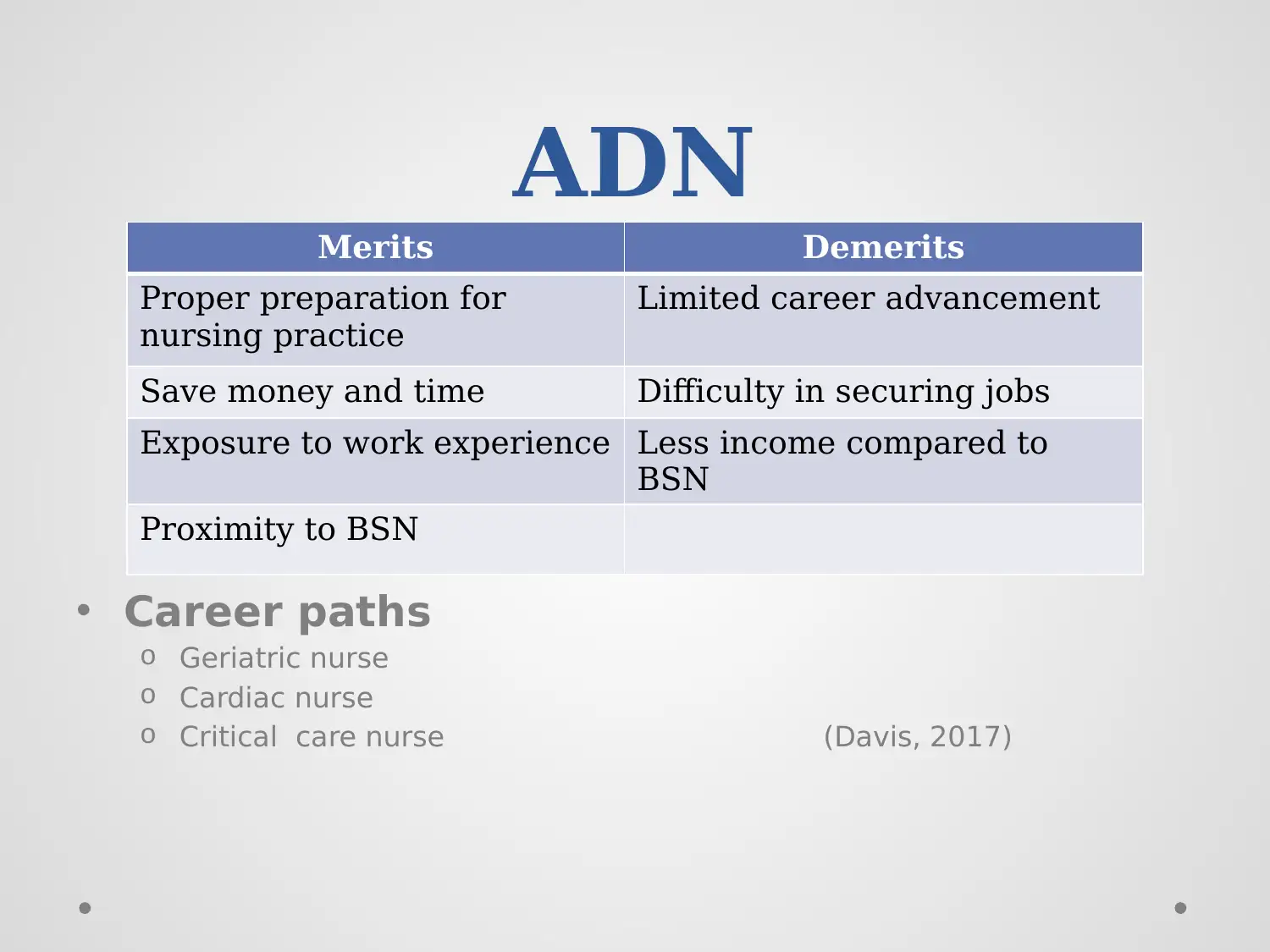
ADN
• Career paths
o Geriatric nurse
o Cardiac nurse
o Critical care nurse (Davis, 2017)
Merits Demerits
Proper preparation for
nursing practice
Limited career advancement
Save money and time Difficulty in securing jobs
Exposure to work experience Less income compared to
BSN
Proximity to BSN
• Career paths
o Geriatric nurse
o Cardiac nurse
o Critical care nurse (Davis, 2017)
Merits Demerits
Proper preparation for
nursing practice
Limited career advancement
Save money and time Difficulty in securing jobs
Exposure to work experience Less income compared to
BSN
Proximity to BSN
Paraphrase This Document
Need a fresh take? Get an instant paraphrase of this document with our AI Paraphraser
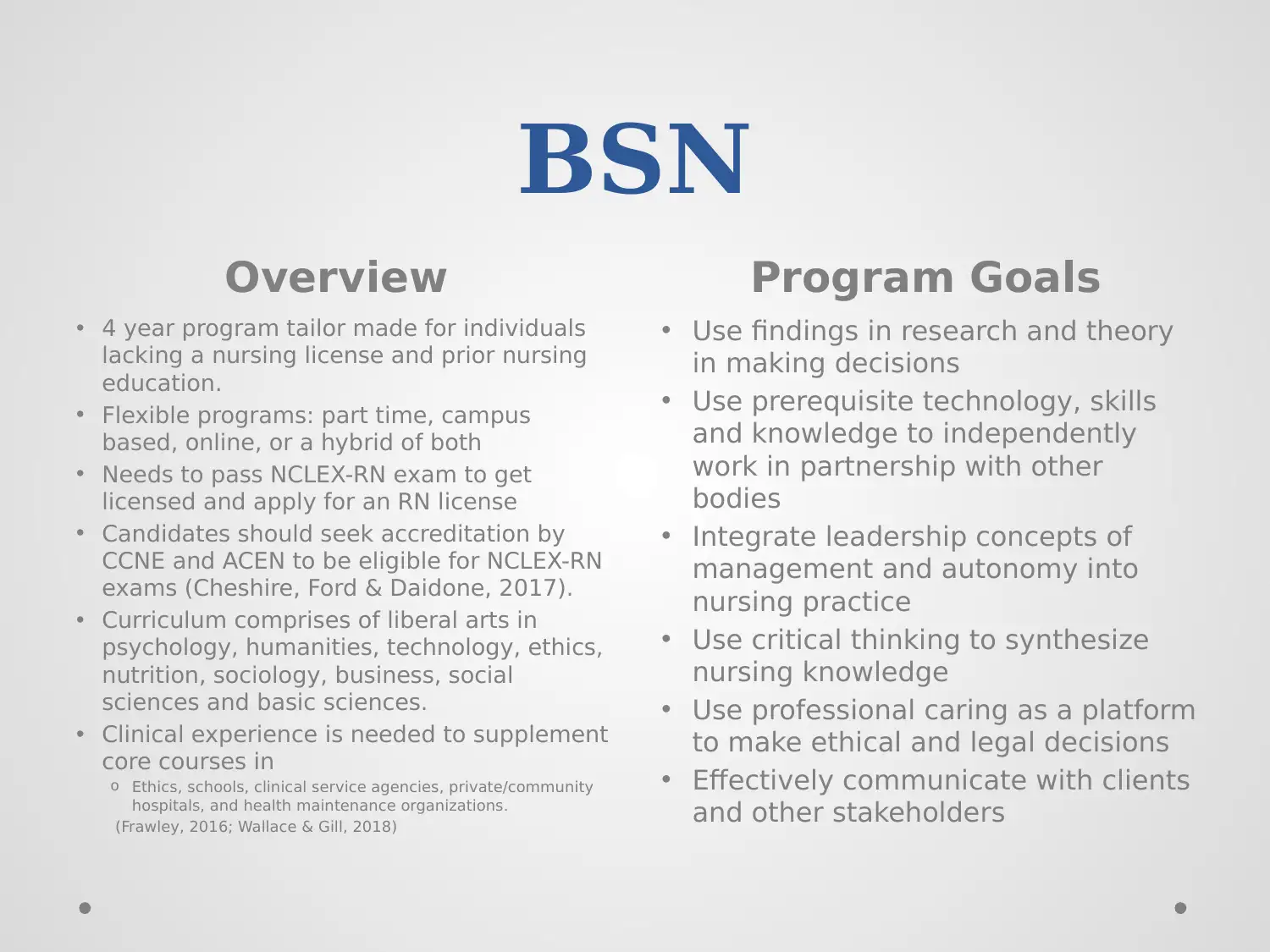
BSN
Overview Program Goals
• 4 year program tailor made for individuals
lacking a nursing license and prior nursing
education.
• Flexible programs: part time, campus
based, online, or a hybrid of both
• Needs to pass NCLEX-RN exam to get
licensed and apply for an RN license
• Candidates should seek accreditation by
CCNE and ACEN to be eligible for NCLEX-RN
exams (Cheshire, Ford & Daidone, 2017).
• Curriculum comprises of liberal arts in
psychology, humanities, technology, ethics,
nutrition, sociology, business, social
sciences and basic sciences.
• Clinical experience is needed to supplement
core courses in
o Ethics, schools, clinical service agencies, private/community
hospitals, and health maintenance organizations.
(Frawley, 2016; Wallace & Gill, 2018)
• Use findings in research and theory
in making decisions
• Use prerequisite technology, skills
and knowledge to independently
work in partnership with other
bodies
• Integrate leadership concepts of
management and autonomy into
nursing practice
• Use critical thinking to synthesize
nursing knowledge
• Use professional caring as a platform
to make ethical and legal decisions
• Effectively communicate with clients
and other stakeholders
Overview Program Goals
• 4 year program tailor made for individuals
lacking a nursing license and prior nursing
education.
• Flexible programs: part time, campus
based, online, or a hybrid of both
• Needs to pass NCLEX-RN exam to get
licensed and apply for an RN license
• Candidates should seek accreditation by
CCNE and ACEN to be eligible for NCLEX-RN
exams (Cheshire, Ford & Daidone, 2017).
• Curriculum comprises of liberal arts in
psychology, humanities, technology, ethics,
nutrition, sociology, business, social
sciences and basic sciences.
• Clinical experience is needed to supplement
core courses in
o Ethics, schools, clinical service agencies, private/community
hospitals, and health maintenance organizations.
(Frawley, 2016; Wallace & Gill, 2018)
• Use findings in research and theory
in making decisions
• Use prerequisite technology, skills
and knowledge to independently
work in partnership with other
bodies
• Integrate leadership concepts of
management and autonomy into
nursing practice
• Use critical thinking to synthesize
nursing knowledge
• Use professional caring as a platform
to make ethical and legal decisions
• Effectively communicate with clients
and other stakeholders
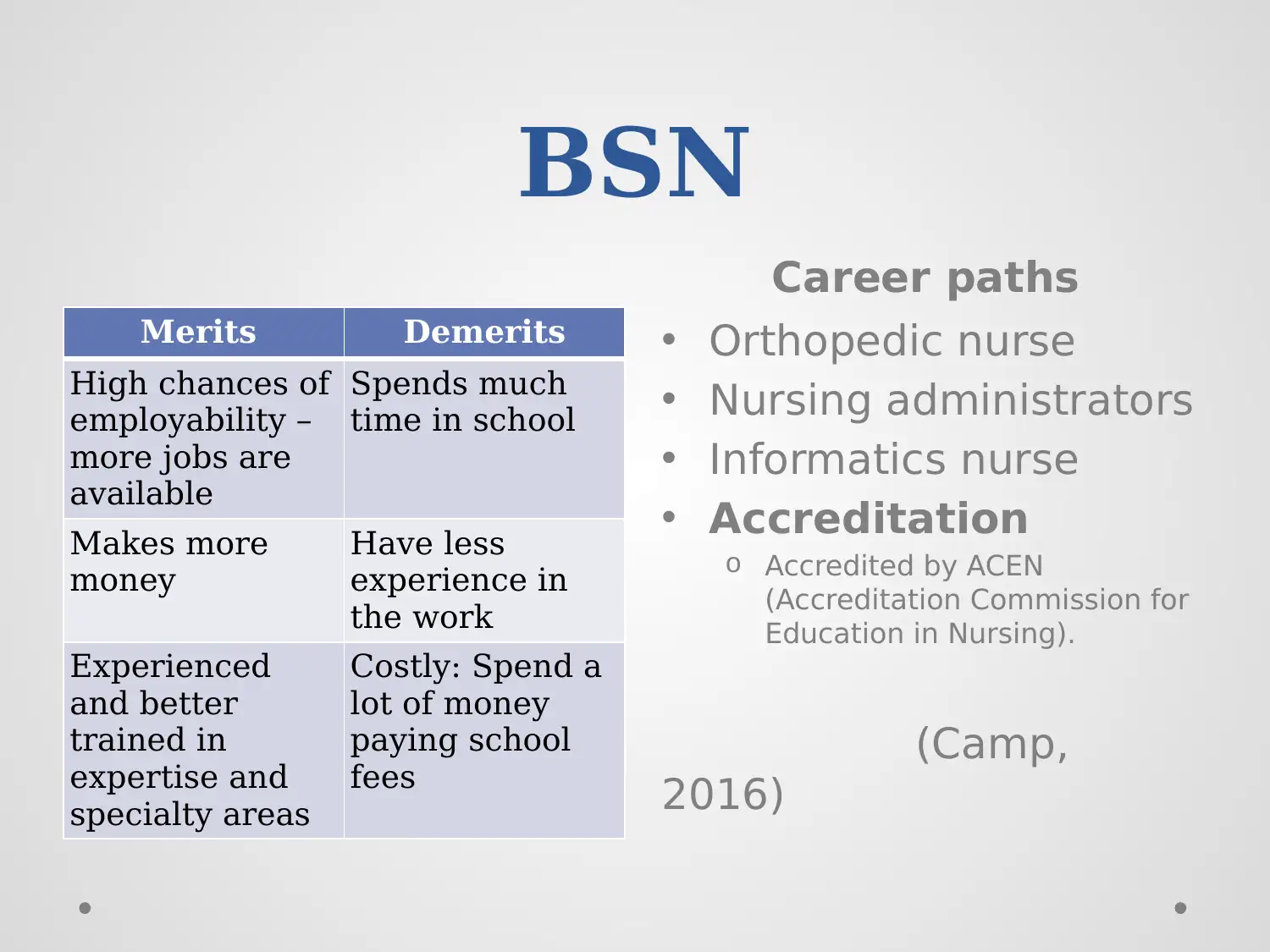
BSN Career paths
Merits Demerits
High chances of
employability –
more jobs are
available
Spends much
time in school
Makes more
money
Have less
experience in
the work
Experienced
and better
trained in
expertise and
specialty areas
Costly: Spend a
lot of money
paying school
fees
• Orthopedic nurse
• Nursing administrators
• Informatics nurse
• Accreditation
o Accredited by ACEN
(Accreditation Commission for
Education in Nursing).
(Camp,
2016)
Merits Demerits
High chances of
employability –
more jobs are
available
Spends much
time in school
Makes more
money
Have less
experience in
the work
Experienced
and better
trained in
expertise and
specialty areas
Costly: Spend a
lot of money
paying school
fees
• Orthopedic nurse
• Nursing administrators
• Informatics nurse
• Accreditation
o Accredited by ACEN
(Accreditation Commission for
Education in Nursing).
(Camp,
2016)
⊘ This is a preview!⊘
Do you want full access?
Subscribe today to unlock all pages.

Trusted by 1+ million students worldwide
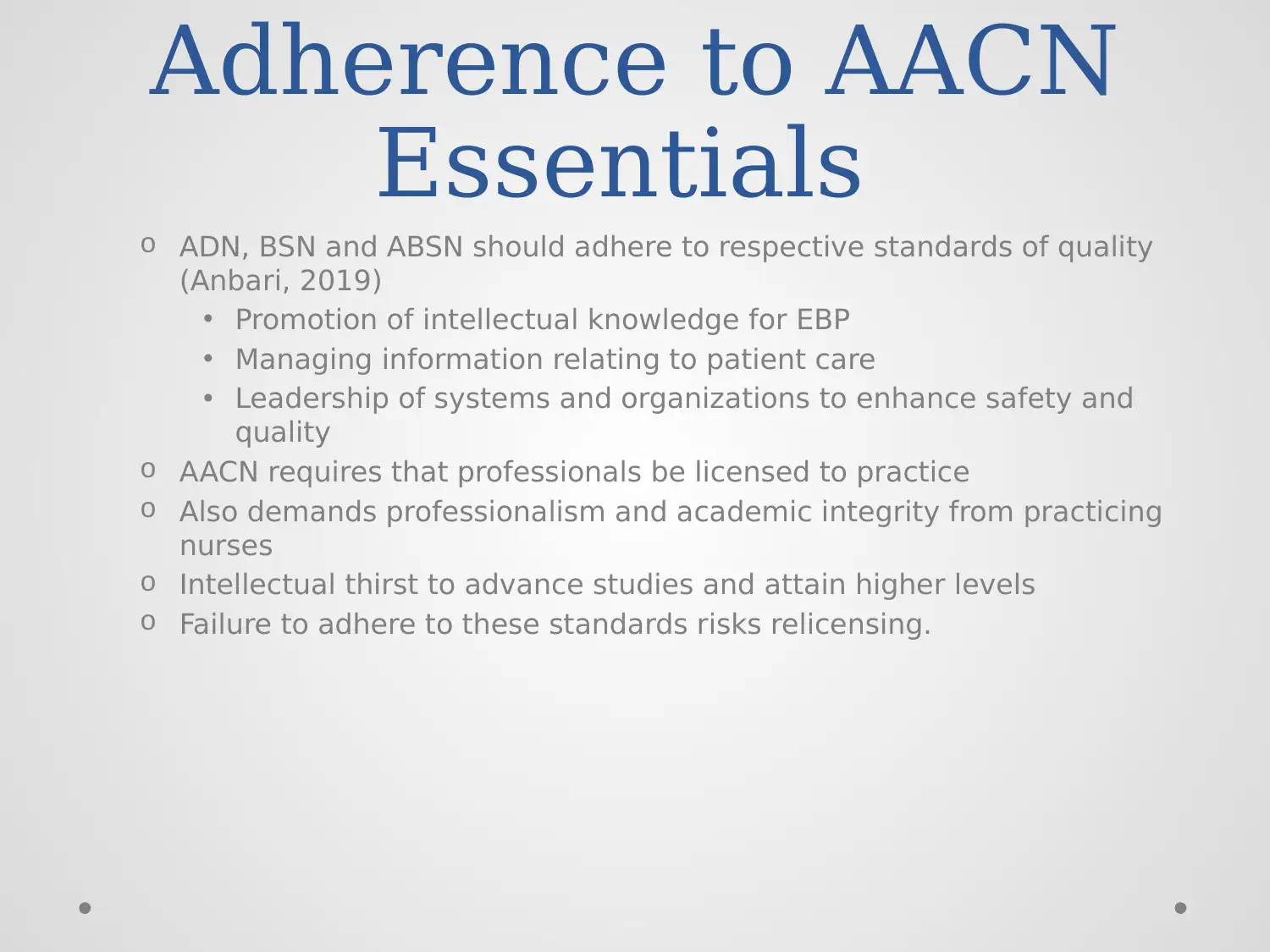
Adherence to AACN
Essentials
o ADN, BSN and ABSN should adhere to respective standards of quality
(Anbari, 2019)
• Promotion of intellectual knowledge for EBP
• Managing information relating to patient care
• Leadership of systems and organizations to enhance safety and
quality
o AACN requires that professionals be licensed to practice
o Also demands professionalism and academic integrity from practicing
nurses
o Intellectual thirst to advance studies and attain higher levels
o Failure to adhere to these standards risks relicensing.
Essentials
o ADN, BSN and ABSN should adhere to respective standards of quality
(Anbari, 2019)
• Promotion of intellectual knowledge for EBP
• Managing information relating to patient care
• Leadership of systems and organizations to enhance safety and
quality
o AACN requires that professionals be licensed to practice
o Also demands professionalism and academic integrity from practicing
nurses
o Intellectual thirst to advance studies and attain higher levels
o Failure to adhere to these standards risks relicensing.
Paraphrase This Document
Need a fresh take? Get an instant paraphrase of this document with our AI Paraphraser
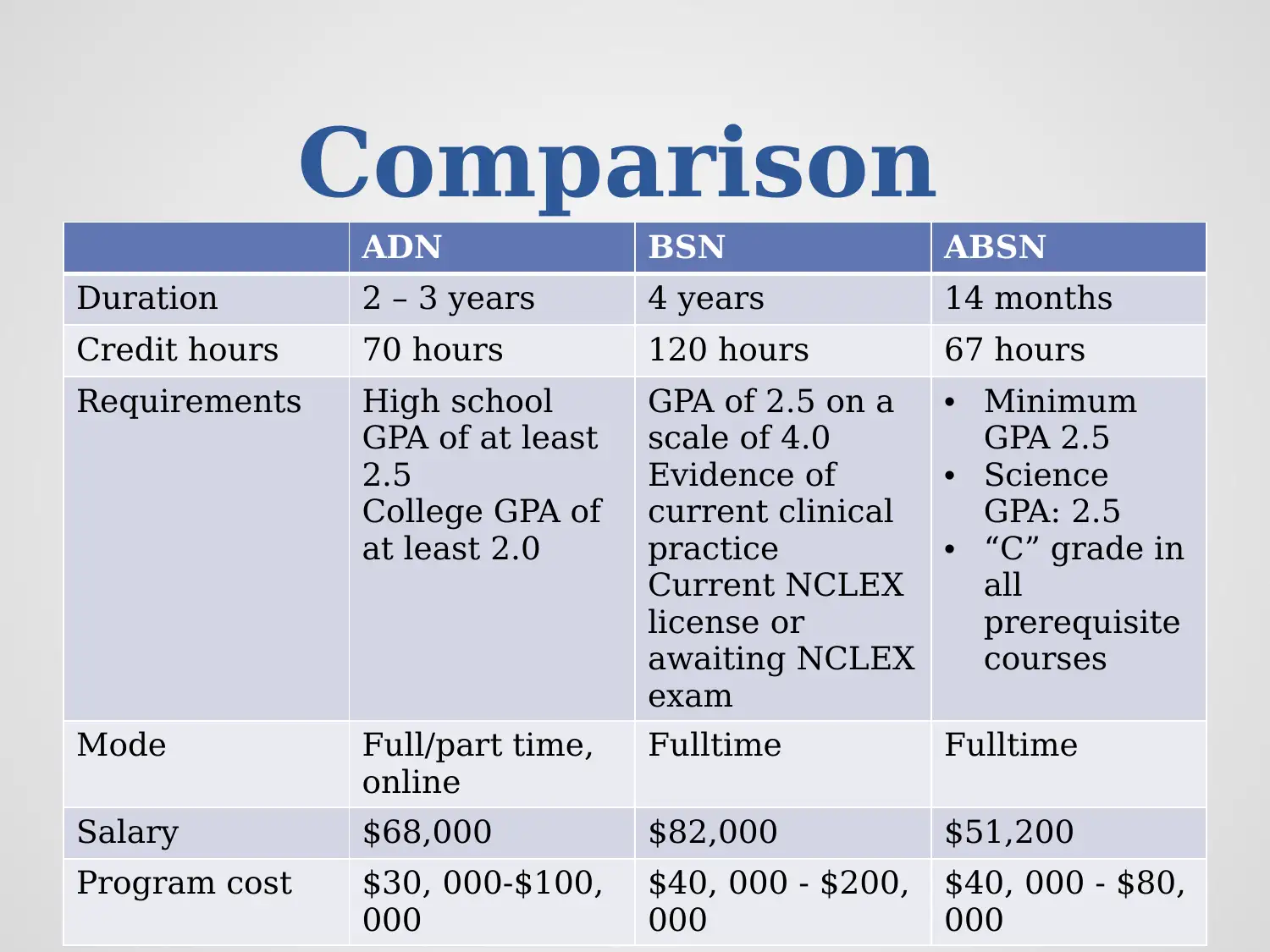
Comparison
ADN BSN ABSN
Duration 2 – 3 years 4 years 14 months
Credit hours 70 hours 120 hours 67 hours
Requirements High school
GPA of at least
2.5
College GPA of
at least 2.0
GPA of 2.5 on a
scale of 4.0
Evidence of
current clinical
practice
Current NCLEX
license or
awaiting NCLEX
exam
• Minimum
GPA 2.5
• Science
GPA: 2.5
• “C” grade in
all
prerequisite
courses
Mode Full/part time,
online
Fulltime Fulltime
Salary $68,000 $82,000 $51,200
Program cost $30, 000-$100,
000
$40, 000 - $200,
000
$40, 000 - $80,
000
ADN BSN ABSN
Duration 2 – 3 years 4 years 14 months
Credit hours 70 hours 120 hours 67 hours
Requirements High school
GPA of at least
2.5
College GPA of
at least 2.0
GPA of 2.5 on a
scale of 4.0
Evidence of
current clinical
practice
Current NCLEX
license or
awaiting NCLEX
exam
• Minimum
GPA 2.5
• Science
GPA: 2.5
• “C” grade in
all
prerequisite
courses
Mode Full/part time,
online
Fulltime Fulltime
Salary $68,000 $82,000 $51,200
Program cost $30, 000-$100,
000
$40, 000 - $200,
000
$40, 000 - $80,
000
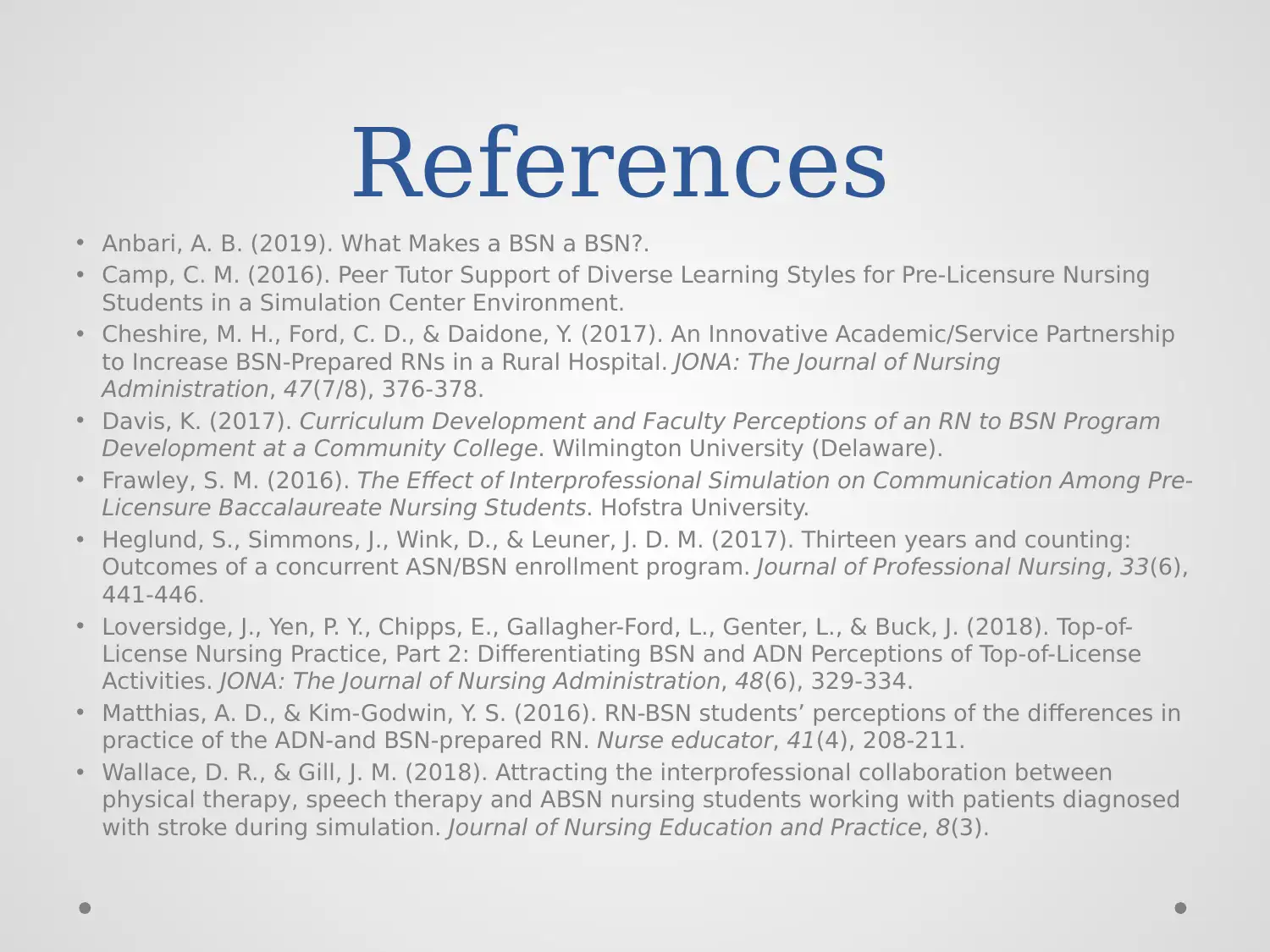
References
• Anbari, A. B. (2019). What Makes a BSN a BSN?.
• Camp, C. M. (2016). Peer Tutor Support of Diverse Learning Styles for Pre-Licensure Nursing
Students in a Simulation Center Environment.
• Cheshire, M. H., Ford, C. D., & Daidone, Y. (2017). An Innovative Academic/Service Partnership
to Increase BSN-Prepared RNs in a Rural Hospital. JONA: The Journal of Nursing
Administration, 47(7/8), 376-378.
• Davis, K. (2017). Curriculum Development and Faculty Perceptions of an RN to BSN Program
Development at a Community College. Wilmington University (Delaware).
• Frawley, S. M. (2016). The Effect of Interprofessional Simulation on Communication Among Pre-
Licensure Baccalaureate Nursing Students. Hofstra University.
• Heglund, S., Simmons, J., Wink, D., & Leuner, J. D. M. (2017). Thirteen years and counting:
Outcomes of a concurrent ASN/BSN enrollment program. Journal of Professional Nursing, 33(6),
441-446.
• Loversidge, J., Yen, P. Y., Chipps, E., Gallagher-Ford, L., Genter, L., & Buck, J. (2018). Top-of-
License Nursing Practice, Part 2: Differentiating BSN and ADN Perceptions of Top-of-License
Activities. JONA: The Journal of Nursing Administration, 48(6), 329-334.
• Matthias, A. D., & Kim-Godwin, Y. S. (2016). RN-BSN students’ perceptions of the differences in
practice of the ADN-and BSN-prepared RN. Nurse educator, 41(4), 208-211.
• Wallace, D. R., & Gill, J. M. (2018). Attracting the interprofessional collaboration between
physical therapy, speech therapy and ABSN nursing students working with patients diagnosed
with stroke during simulation. Journal of Nursing Education and Practice, 8(3).
• Anbari, A. B. (2019). What Makes a BSN a BSN?.
• Camp, C. M. (2016). Peer Tutor Support of Diverse Learning Styles for Pre-Licensure Nursing
Students in a Simulation Center Environment.
• Cheshire, M. H., Ford, C. D., & Daidone, Y. (2017). An Innovative Academic/Service Partnership
to Increase BSN-Prepared RNs in a Rural Hospital. JONA: The Journal of Nursing
Administration, 47(7/8), 376-378.
• Davis, K. (2017). Curriculum Development and Faculty Perceptions of an RN to BSN Program
Development at a Community College. Wilmington University (Delaware).
• Frawley, S. M. (2016). The Effect of Interprofessional Simulation on Communication Among Pre-
Licensure Baccalaureate Nursing Students. Hofstra University.
• Heglund, S., Simmons, J., Wink, D., & Leuner, J. D. M. (2017). Thirteen years and counting:
Outcomes of a concurrent ASN/BSN enrollment program. Journal of Professional Nursing, 33(6),
441-446.
• Loversidge, J., Yen, P. Y., Chipps, E., Gallagher-Ford, L., Genter, L., & Buck, J. (2018). Top-of-
License Nursing Practice, Part 2: Differentiating BSN and ADN Perceptions of Top-of-License
Activities. JONA: The Journal of Nursing Administration, 48(6), 329-334.
• Matthias, A. D., & Kim-Godwin, Y. S. (2016). RN-BSN students’ perceptions of the differences in
practice of the ADN-and BSN-prepared RN. Nurse educator, 41(4), 208-211.
• Wallace, D. R., & Gill, J. M. (2018). Attracting the interprofessional collaboration between
physical therapy, speech therapy and ABSN nursing students working with patients diagnosed
with stroke during simulation. Journal of Nursing Education and Practice, 8(3).
⊘ This is a preview!⊘
Do you want full access?
Subscribe today to unlock all pages.

Trusted by 1+ million students worldwide
1 out of 12
Related Documents
Your All-in-One AI-Powered Toolkit for Academic Success.
+13062052269
info@desklib.com
Available 24*7 on WhatsApp / Email
![[object Object]](/_next/static/media/star-bottom.7253800d.svg)
Unlock your academic potential
Copyright © 2020–2026 A2Z Services. All Rights Reserved. Developed and managed by ZUCOL.





